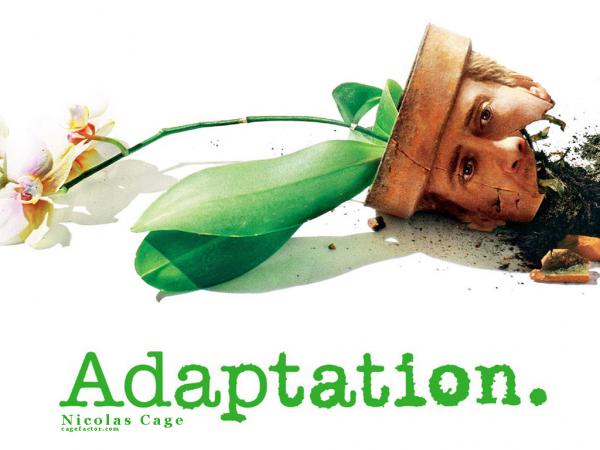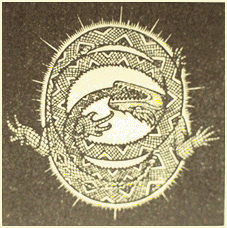Serendip is an independent site partnering with faculty at multiple colleges and universities around the world. Happy exploring!
Notes Towards Day 25 (Tues, Apr. 17): Adapting--and Self-Reflecting?


I. coursekeeping
for Thursday, read H.G. Wells' 1898 short science
fiction novel, "The War of the Worlds"; web edition 1995.
(leamirella: taking some responsibility for this discussion,
and/or the one after?)
@ the time it was published, this story was actually
categorized as "scientific romance"-- an archaic (?) term
for what we now call science fiction, originating in the 1850s to
describe the combination of fiction with elements of scientific writing
this is one of the earliest stories detailing a conflict between humans and aliens--
in that way a precursor to Slaughterhouse Five --so you might want also
to think about those connections/differences (war? peace?); it also
anticipated the wholesale destruction of cities that occured in WWII
"The War of the Worlds" inspired multiple more explicit spin-offs
(plus Robert Goddard's invention of the first liquid-fueled rocket,
Freeman Dyson's search for extraterrestial life....!);
next week we'll be comparing Wells's text with the most famous
of these, the 1938 sound recording of the story by Orson Welles,
so we will also repeat the exercise we did last week:
I will ask you to take some time in class to begin sketching a
radio version of the story to be broadcast NOW.
Wells' story has (of course) a particular cultural location:
end-of-century fears of apocalypse; pre-WWI fears of invasion;
height-of-British-empire critique of imperialism, religion, celebration of science...
what are our current cultural fears? how might you put them into aurality?
(more effectively than Independence Day....?)
once the future imagined by science fiction becomes the present of the reader...
what happens next?
II. this weekend some of you were already thinking about this....
froggies315: what are we going to do with all the contradictory
stuff we've learned this semester...What are we going to do that
is useful? This is sort of a terrifying question.
KT: the questions that we’ve pondered can’t be undone....
life will be tough from here on out, more questions and more
uncertainties, but ...more depth and development too.
kobieta: It is extremely hard and difficult to change opinions...
but whole is to get us thinking... life never makes sense, only fiction
does... in my intro bio labs ...Wil encourages us to "develop questions,
design methods to answer those questions, collect and analyzing
observations and develop evidence based explanations"....
so too has this course.
sterrab: I have learned the distinctions between genres as well
as the thin walls that separate them all...."we need to find originality
within genre" [quote from Adaptation]...It is the writer's goal to bend
the rules that are set within a genre and make something exceptional
and outstanding out of it.
dglasser: Passion suggests more longevity than obsession....passion
also suggests, to me, some sort of completion; a completion of self.
While obsession seems more external...passion is more of something
you take in; my passion is doing; -ing is my passion....can you ever
know your passions? I think you can...
III. last week we imagined some movies;
today we discuss one that actually got made!
froggies315: it seemed like a cautionary tale about the
perils of telling other people’s stories, of what can happen
when someone becomes so obsessed with telling a story
that he becomes part of that story and truth and reality bend
and everything is confusing and unclear. In this way, I think
this movie fits nicely with a lot of the conversations we’ve had...
leamirella: there is no way of completely translating the book
to a movie that stays true to the "original" writer.
EGrumer: I find Adaptation to be a fascinating film, and one of the
main reasons why is probably the questions of accuracy. It's a movie
about someone earnestly trying to make The Orchid Thief into an
accurate movie, and as such it is one of the least faithful literary
adaptations I've ever known....I feel as if Adaptation is ...about the
difficulty of adapting books to film ...
Ayla: when I read the book, I kept waiting for something to happen
between them - it was killing me. So my movie was a love story of
a mismatched couple.
What surprised us in Adaptation?
What happened to the book
when it was adapted into a movie?
What do we think of Adaptation?
What were our initial, critical reactions to the film?
IV. Moving from evaluation to explanation, theorizing now:
how might the film contribute to our ongoing explorations
of both the genre of evolution and the evolution of genres?
Jonathan Culler, Literary Theory, 15-17: theory is endless...
an unbounded corpus of writing which is always being augmented...
a resource for constant upstagings.... unmasterable... open ended...
the condition of life itself... the questioning of presumed results and
the assumptions on which they are based. The nature of theory is to undo...
what you thought you knew, so the effects of theory are not predictable.
(as opposed to critique: measuring what's new against what you already know??)
Three interpretations of the film to get us going:
Lucas Hilderbrand. "Review: Adaptation." Film Quarterly 2004, 58.1 (Fall): 36-43.
Jonze and Kaufman "rooted their film Adaptation's intertextual mental masturbation
in autoerotic fantasy. Legible as a gimmicky self-reflexive exercise, a comedy of
narcissistic neurosis, or a proufound self-portrait of artistic endeavor, Adaptation
productively narrativizes masturbation's myriad associations, pathologies, and possibilities."
Barbara Simerka and Christopher Weimer, "Duplicitous Diegesis:
Don Quijote and Charlie Kaufman's Adapation." Hispania 2005, 88.1: 91-100.
a comparative study centered on "the representation of self-inscriptive narrative
acts and the juxtaposition of disparate generic forms to create parody."
Gary Bortolotti and Linda Hutcheon, "On the Origin of Adaptations:
Rethinking Fidelity Discourse and 'Success'--Biologically."
New Literary History 2007, 38: 443-458.
"As a biologist and a literary theorist... we would like to propose...
a homology between biological and cultural adaptation... a similarity in
structure that is indicative of a common origin: that is, both kinds of
adaptation are understandable as processes of replication ... both evolve
with changing environments... biological thinking may help move us beyond...
'fidelity discourse'.... to think anew about the broader questions of why
and how certain stories are told and retold.... moving out of an evaluative
discourse and into a descriptive one... As Terry Pratchett has reminded us:
'Stories, great flapping ribbons of shaped space-time, have been blowing
and uncoiling around the universe since the beginning of time. And they
have evolved. The weakest have died and the strongest have survived
and they have grown fat on the retelling.'"
Let's think about these generic questions:
what happens when a book is adapted into a film?
Does it grow "fat" or "thin"?
What happens when a written story is
re-told as a sequence of moving pictures?
Remember novelist/filmmaker Marguerite Duras:
"A word contains a 1000 images" (vs. the more
conventional "a picture is worth a 1000 words")
Cf. Virginia Woolf, who deplored the simplification that inevitably occurs
in the transposition of literary work to the visual medium, calling film a "parasite,"
and literature its "prey" and victim."
Sally Potter said that her adaptation of
Virginia Woolf's Orlando to the screen was a process of
- distillation
- simplification,
- pragmatism,
- propulsion,
- motivation,
- loss (and the celebration of loss?),
- the articulation of a political stance
against property and privilege, and... - presentism.
What happened when this particular book, The Orchid Thief,
was adapted into this particular film, Adaptation?
What was kept, what was changed?
What was foregrounded/backgrounded?
How did the story evolve?
What commentary does Adaptation itself offer on the making of film?Charlie Kauffman: No one's ever done a movie about flowers before.
So there are no guidelines...
I'd wanna let the movie exist, rather than be artificially plot-driven.
Robert McKee: ...and God help you if you use voice-over in your work, my friends.
God help you. That's flaccid, sloppy writing. Any idiot can write a voice-over narration
to explain the thoughts of a character.
What are the (differing?) logics of organization
in Orlean's book and Kauffman's film?
Susan Orlean: There are too many ideas and things and people.
Too many directions to go. I was starting to believe the reason it
matters to care passionately about something is that it whittles
the world down to a more managable size.
Donald Kauffman: Did you know that there hasn't been a new genre
since Fellini invented the mockumentary...? My genre's thriller, what's yours?
Charlie Kauffman: I don't want to cram in sex or guns or car chases or
characters learning profound life lessons or growing or coming to like
each other or overcome obstacles to succeed in the end. The book
isn't like that, and life isn't like that, it just isn't.
V. Is the film he eventually writes (the one we eventually see)
formulaic precisely in the way he doesn't want it to be?
How well does it follow the guidelines advocated by Robert McKee?
Donald Kaufman: Not rules, principles. McKee writes that a rule says
you *must* do it this way. A principle says, this *works* and has through
all remembered time.
Robert McKee: I'll tell you a secret. The last act makes the film. Wow
them in the end, and you've got a hit.... Find an ending, but don't cheat,
and don't you dare bring in a deus ex machina. Your characters must
change, and the change must come from them.
Is there a deus ex machina in Adaptation?
Do the characters change?
Susan Orlean: I want my life back. I want it back before everything got
fucked up. I want to be a baby again. I want to be new. I WANT TO BE NEW.
Charlie Kaufman: "I have no understanding of anything except myself."
VI. To what degree does the self-referentiality of the movie "eat itself"?
To what degree does the "diegesis" (telling) eat/trump/control
the "mimesis" (showing) of the film? (referencing here the Kaufmans'
conversation about "ouroboros").
What role might ouroboros --self-reflexivity
or cyclicality--play in evolution??
John Laroche: You know why I like plants?....Because
they are so mutable. Adaptation is a profound process.
Means you figure out how to thrive in the world.
Susan Orlean: Yeah but it's easier for plants.
I mean they have no memory. They just move on
to whatever's next. With a person though, adapting
is almost shameful. It's like running away.
.... What I came to understand is that change is not
a choice. Not for a species of plant, and not for me.
In an interview included @ the back of The Orchid Thief, Susan Orlean said,
"I try to figure out if there is destiny and fate or if life is just haphazard.
What we search for is a kind of order and logic in what is the chaotic and
illogical experience of being alive. I think you grab on to little footholds that
make you think that there is logic and that there is some sense of order in your life
...I can't believe there isn't a grand design that is always unfolding in front of us...
Or, aren't we all inventions of our own choices and decisions?
VII. How does the experience of watching a film differ from that of reading a novel?
(particularly in terms of perceiving the world "underground," the unconscious??)
What can we say, from the diversity of our experience,
about the difference in genre that making/viewing a movie makes?
how does a film differ as a literary kind from a written narrative?
what can that new form accomplish that a written prose narrative can not?
(and vice versa?)



